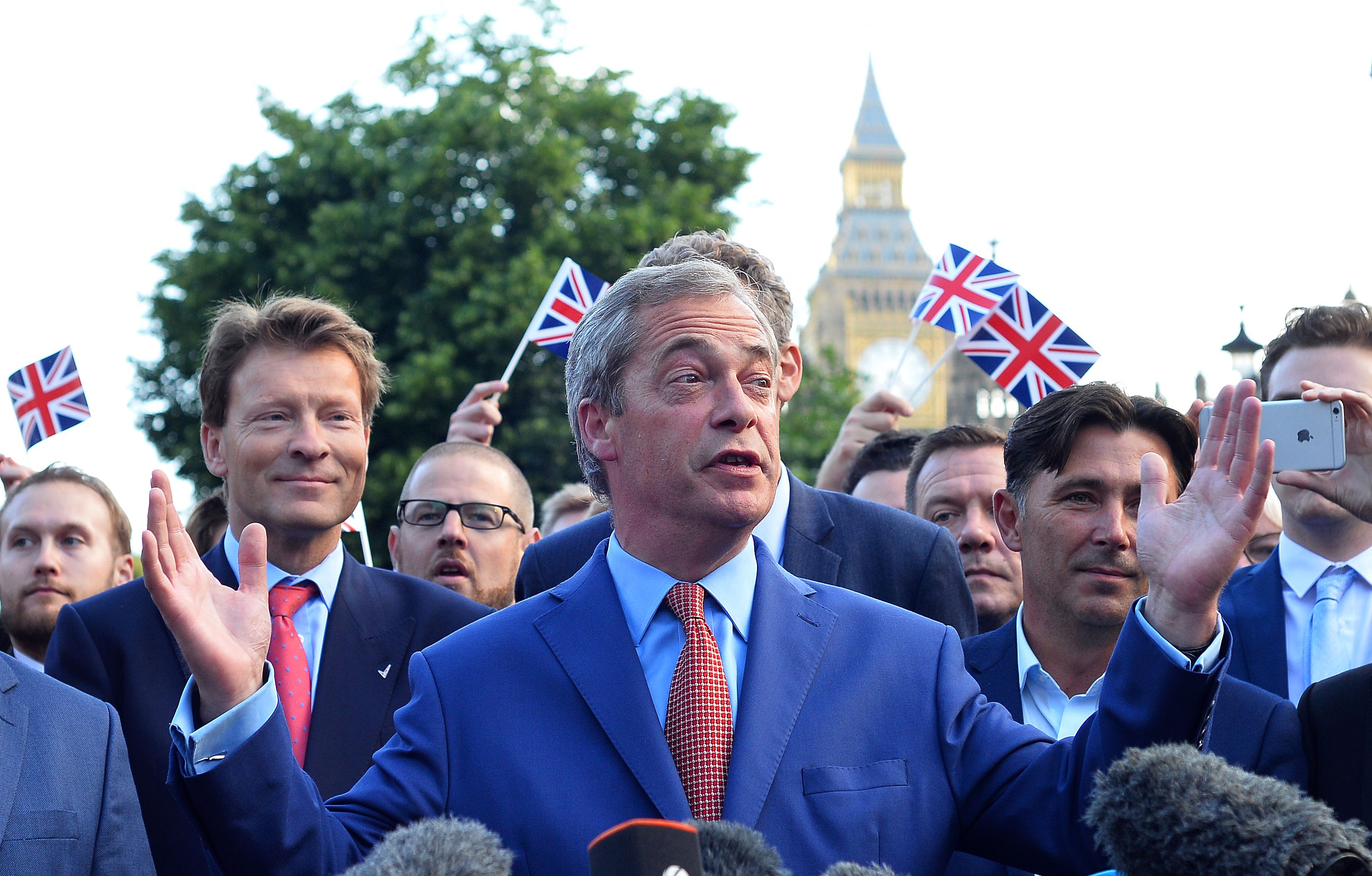Why Brexit did Europe a favor
Now that the European Union has shrunk, perhaps it can deepen


Britain's vote to exit the European Union has done Europe an enormous favor, no matter whether you think "Europe" is a good or bad idea.
If you think it's a bad idea, then Britain is about to prove that it is possible to leave and survive. The transition is going to be expensive — Britain will enter a recession in the short term, and the long-term transition may be even more painful than the short, particularly if London cannot retain its position as the financial capital of Europe. But if Britain wants to be a country rather than a city-state, it's a transition it will have to make at some point. Merely by proving it can be done, Britain will give heart to any other state reconsidering rule from Brussels.
But if you think Europe is a good idea, then you must think it can be made to work. And the only way Europe can work is by becoming a deeper union. The euro can only function if Europe has a common fiscal policy. Europe can only wield diplomatic clout commensurate with its demographic and economic bulk if it has a common defense policy. And Britain was always going to remain the largest, strongest foot-dragger to further cessions of national sovereignty.
The Week
Escape your echo chamber. Get the facts behind the news, plus analysis from multiple perspectives.

Sign up for The Week's Free Newsletters
From our morning news briefing to a weekly Good News Newsletter, get the best of The Week delivered directly to your inbox.
From our morning news briefing to a weekly Good News Newsletter, get the best of The Week delivered directly to your inbox.
Now, given America’s failed experiment with the Articles of Confederation, and the painful experience of the American Civil War, you would think we would appreciate the need for unity, and an effective central government. But in fact, we strongly opposed a British exit precisely because of their foot-dragging.
The United States only ever wanted Britain to remain in the EU because we always favored a broader Europe over a deeper one. We wanted to make sure a country that saw the world in similar terms to the way we saw it remained inside the European tent. And we opposed a more deeply united Europe that might steer its own course apart from America, particularly if it developed a genuinely independent defense capability outside of NATO.
It has never been obvious that this policy has been in America's best interest rightly understood. If Europe is to be our ally, then we need that ally to be able to pull its weight. A weak, dysfunctional, and dependent Europe serves nobody's interests, including America's. Those who really believe in a functional version of a European Union, as opposed to a fantasy version, must believe that Europe can become, over time, something more like a nation. And if that is what Europe is to be, then an ever-broader union is a mistake, inasmuch as it makes deepening the union ever more difficult and expensive. If Europe must deepen, it must first shrink.
"Deepen" does not necessarily mean becoming a highly centralized, unitary state, much less a homogeneous culture. The United States' federal system reserves considerable power to the several states; Canada's federal system reserves even more power to its provinces, as does Germany to its Länder and Switzerland to its cantons. There's no reason why Europe could not go down a similar path.
A free daily email with the biggest news stories of the day – and the best features from TheWeek.com
To do so, however, its founding members must compromise their conflicting visions of what Europe is supposed to be. Germany is going to have to accept that it has an open-ended responsibility for the welfare of citizens of other European states. Not for the states themselves, much less their leaders — but for their citizens: Germans will have to come to see Greeks as more like Ossis than like Ausländer. And France is going to have to accept that a functional Europe is one in which France is just a large and powerful province rather than an empire of its own.
That price may not be worth paying, for either country. If it isn't, Britain's impending exit gives these two central states to the European project the opportunity to rethink, and renegotiate, the project itself. A less-ambitious, confederal Europe that stuck to being a common market might well endure better than the current arrangement — and might entice Britain back in.
Meanwhile, if Europeans decide to pay the price for true union, and the gamble pays off, then some in Britain may come to regret having missed out on the opportunity to be present at the creation — or, alternatively, to have prevented it. But Britons should abjure regret. This is not the 19th century. Britain cannot decide the fate of the continent. Nor can it be central to its affairs. In the context of a united Europe, Britain can either be an independent nation and bridge between Europe and America or it can be an important but ultimately peripheral province of a united European state.
By leaving, the British make it possible for Europe to choose its own destiny, and for Britain to choose whether and how to join it.
Noah Millman is a screenwriter and filmmaker, a political columnist and a critic. From 2012 through 2017 he was a senior editor and featured blogger at The American Conservative. His work has also appeared in The New York Times Book Review, Politico, USA Today, The New Republic, The Weekly Standard, Foreign Policy, Modern Age, First Things, and the Jewish Review of Books, among other publications. Noah lives in Brooklyn with his wife and son.
-
 The UK’s best Christmas pantos
The UK’s best Christmas pantosThe Week Recommends Dive into the festive cheer, even into the new year, with some traditional favourites and modern twists
-
 The longevity economy is booming as people live longer
The longevity economy is booming as people live longerThe Explainer The sector is projected to reach $27 trillion by 2030
-
 Sudoku hard: December 11, 2025
Sudoku hard: December 11, 2025The daily hard sudoku puzzle from The Week
-
 Femicide: Italy’s newest crime
Femicide: Italy’s newest crimeThe Explainer Landmark law to criminalise murder of a woman as an ‘act of hatred’ or ‘subjugation’ but critics say Italy is still deeply patriarchal
-
 Brazil’s Bolsonaro behind bars after appeals run out
Brazil’s Bolsonaro behind bars after appeals run outSpeed Read He will serve 27 years in prison
-
 Americans traveling abroad face renewed criticism in the Trump era
Americans traveling abroad face renewed criticism in the Trump eraThe Explainer Some of Trump’s behavior has Americans being questioned
-
 Nigeria confused by Trump invasion threat
Nigeria confused by Trump invasion threatSpeed Read Trump has claimed the country is persecuting Christians
-
 Sanae Takaichi: Japan’s Iron Lady set to be the country’s first woman prime minister
Sanae Takaichi: Japan’s Iron Lady set to be the country’s first woman prime ministerIn the Spotlight Takaichi is a member of Japan’s conservative, nationalist Liberal Democratic Party
-
 Russia is ‘helping China’ prepare for an invasion of Taiwan
Russia is ‘helping China’ prepare for an invasion of TaiwanIn the Spotlight Russia is reportedly allowing China access to military training
-
 Interpol arrests hundreds in Africa-wide sextortion crackdown
Interpol arrests hundreds in Africa-wide sextortion crackdownIN THE SPOTLIGHT A series of stings disrupts major cybercrime operations as law enforcement estimates millions in losses from schemes designed to prey on lonely users
-
 China is silently expanding its influence in American cities
China is silently expanding its influence in American citiesUnder the Radar New York City and San Francisco, among others, have reportedly been targeted
